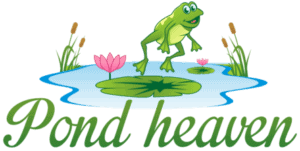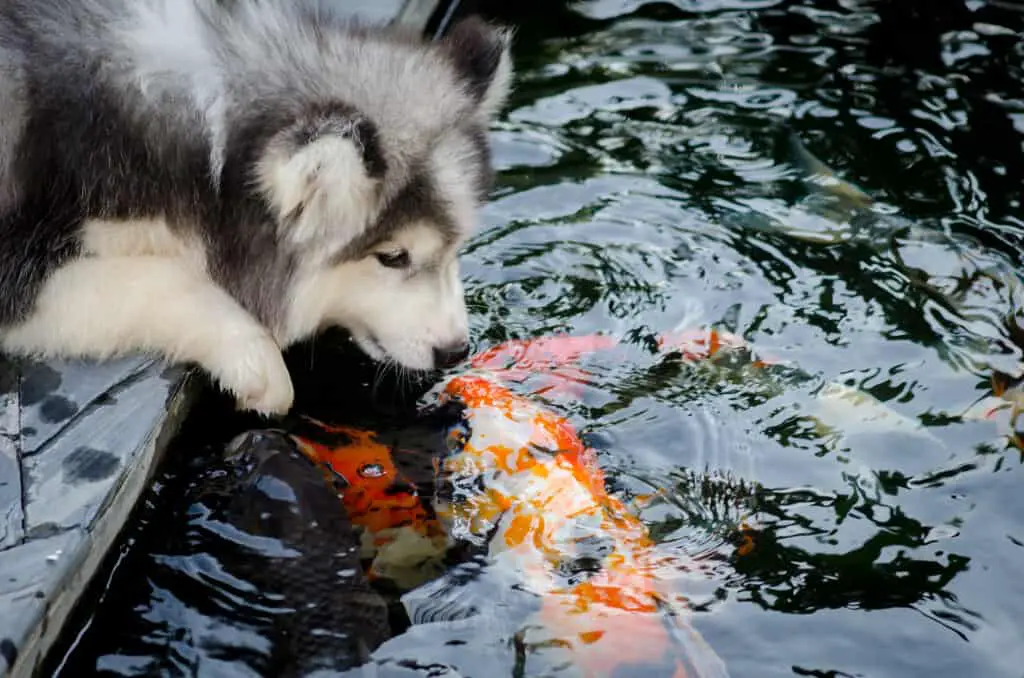
Like all pampered pets, koi love treats and will enthusiastically swim about at the top of the pond while waiting for the next snack to land. The great thing about these pets is that there are so many options, and they are versatile feeders, so unlike your fussy cat, there’s not a lot they won’t consume.
Koi can eat dog food but should only be fed as an occasional treat rather than a staple food. Although they will consume dog pellets eagerly, it does not provide balanced nutrition for koi. Dog food is often high in fatty acids and contains the wrong type of protein required by koi.
Most koi owners have heard of people who only feed their fish with dog food. It’s usually cheaper than koi pellets, available in more stores, and koi seem to love it. However, just because koi can consume dog food doesn’t mean they should.
Pro Tip: If you’re tired of wasting money and making costly mistakes on the koi-keeping hobby or are thinking about buying koi fish but don’t know where to start, I strongly suggest you check out this ebook. I recently read this ebook, and it contains SO much useful information, such as:
- 3 proven steps to identify koi fish diseases
- WARNING: 3 things you should NEVER do when it comes to caring for koi
- When to seek professional help when it comes to looking after your koi
Can Koi Eat Dog Food?

Koi can eat dog food, but it should never replace nutritionally balanced koi pellets. Feeding high-quality koi food will maximize growth and optimize the color of the fish. Ultimately, they have the best chance of living a long and healthy life if they get food that most closely mimics natural foods that they would be able to forage in the wild.
Although the dog food bag may indicate that the food is high in protein, it is not the correct type your fish needs. Dog food often contains a significant amount of dairy or animal fats which are not digestible for koi. Koi usually hungrily consume dog food, and if the pellets are the right size, they love them, but too much of a delicious thing may come at a long-term health price.
Fatty liver disease is a major concern for koi and other captive fish fed incorrect diets. The animal fats in the food, often from beef or poultry sources, can crystalize in the koi’s liver. The fish may appear fat and healthy while swimming about for years with fatty liver disease, which will significantly shorten their lifespan. This is a chronic condition that is a slow killer.
Koi are omnivorous and small amounts of decent quality dog food won’t do too much harm if it is included in their diet occasionally. In the wild, koi, like their carp relations, would swim along the bottom of the water, sifting through the mud for tasty morsels and snacks like shrimp or worms. They would also consume plenty of plant material.
Dog food is safe to feed koi in moderation. They will tuck into dog food pellets, but it will not give them all the nutrients they need to grow and thrive.
In the same way you wouldn’t feed cat food to your dog or koi food to your parrot, each type of food has been specifically formulated to be digestible and meet the nutritional requirements of the species it was developed for.
An added issue with feeding dog food to koi regularly is that it could affect the water quality over time. Oily or fatty dog foods could create an unhealthy residue on the surface, while a buildup of dissolved dog food may cause an increase in ammonia concentrations in the water.
Only feed dog food kibble as a treat and never feed more than the koi in the pond can eat in a few minutes. Any extra food will dissolve and create a mess of murky water that may even become smelly.
If you have other pets, such as a cat, you may have leftover cat food and may wonder if you can feed your fish the excess food. If so, you can read my blog post here: can koi fish eat cat food?
Is Dog Food Safe For Koi Fish?
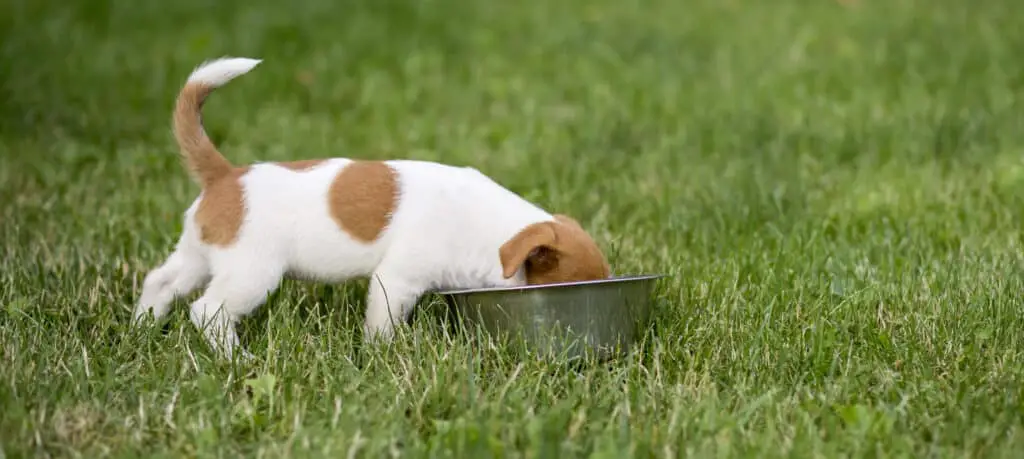
Dog food is okay for koi in low amounts. If fed as a staple food, it is not safe and can significantly shorten a fish’s lifespan. Think of it as a person eating fast food every day. While they would certainly survive, it would not be a healthy or balanced diet for a prolonged period.
Koi food contains the right amount of protein, vitamins, and minerals that koi can easily digest and metabolize. Dog food has extracts from beef or poultry, which would never usually form part of a koi diet in the wild, and their bodies cannot properly digest these types of animal proteins and fat.
Koi are omnivorous and enjoy foods ranging from garlic to cooked rice and watermelon. They are interested in their environment and are interactive fish. Adding more variety to their diet by including some dog food kibble as an occasional treat won’t do any harm. It is perfectly fine to occasionally add dog kibble to your koi’s menu as a treat to add variety.
The problem with pond owners who feed their koi dog food is that they often interpret the fish’s enthusiasm for feeding and weight gain as good health. Dog food is specifically formulated to nourish warm-blooded canines. Pond koi have different nutritional requirements, and too much dog food can start causing immense health problems.
While the koi in a pond may look fat and happy on a diet of puppy chow, their long-term health is often significantly affected. Fatty liver disease is often the eventual outcome as koi cannot digest or process foods high in fatty acids like those found in most dog pellets.
So, by all means, add a handful of dog food as an occasional treat, along with other snacks like cooked rice, fruit, shrimp, worms, and vegetables, but avoid using it as staple koi food. If they are healthy, koi can live more than 25 years, so don’t think that because someone’s fish are still alive and well after a couple of years of eating dog pellets, they are in excellent health. The truth is that their lifespan is undoubtedly being negatively impacted.
You may wonder what other foods koi fish can eat, such as bread or rice. If so, you can read my blog posts here: can koi fish eat bread? and can koi fish eat rice?
What Can You Feed Koi If You Run Out Of Food?
If you have run out of koi pellets and can’t immediately go out and get more, plenty of alternatives will be able to tide you over. Koi are pretty easygoing and natural foragers, so there are plenty of things you can use that will quickly be gobbled up by your pond’s inhabitants.
While there are plenty of options, an important consideration is the food’s size. Koi may be able to nibble at large pieces of soft fruit, like watermelon slices that are added to the water, but hard items like large grapes or cauliflower need to be chopped up into bite-sized pieces or risk becoming rotting debris in the pond.
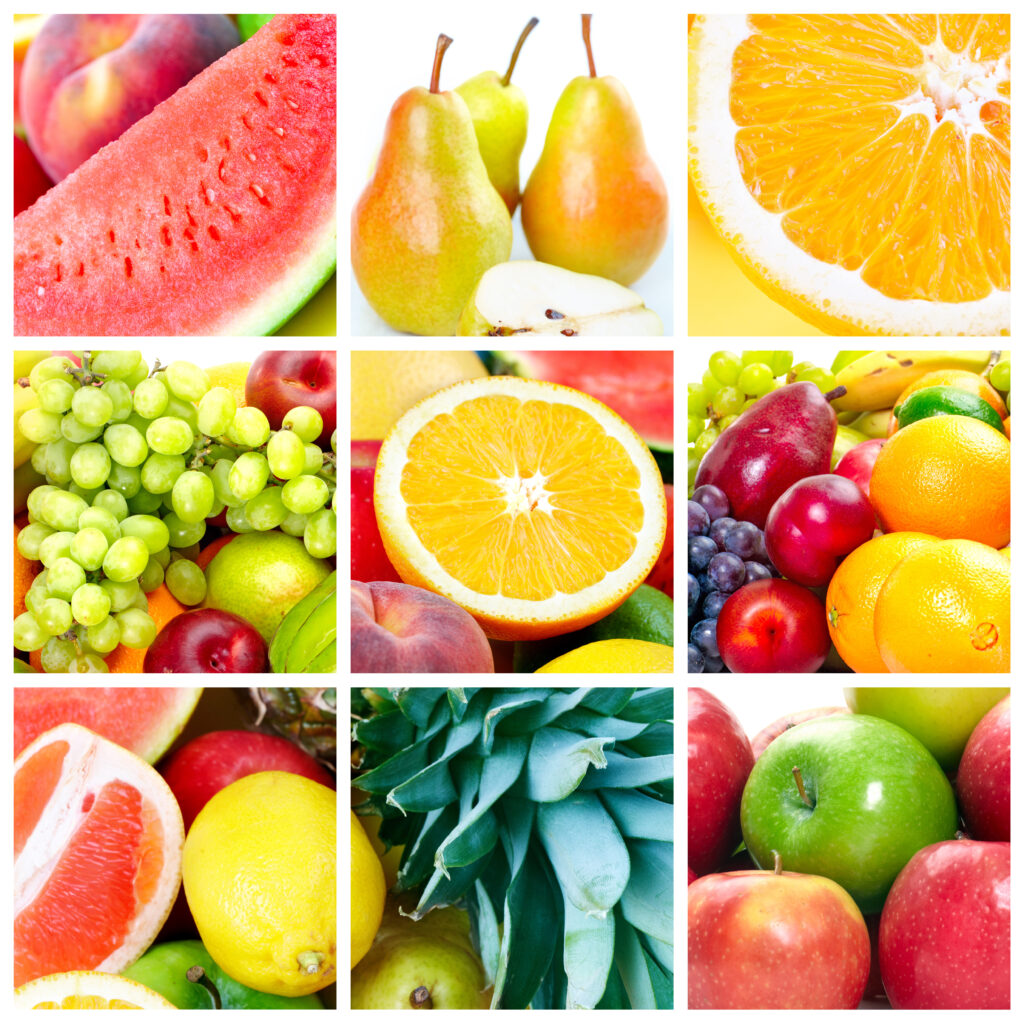
Koi pellets are nutritionally balanced and provide the necessary nutrients and minerals in a digestible form for the fish. This should always be the staple of the koi diet, but if you run out, there are a couple things you can use for short periods.
Do not assume that all human food is suitable or safe for koi. They may eagerly consume anything thrown into the pond, but some food needs to be completely off-limits.
The table below shows foods that can be used as a temporary feed or treat for koi and those that must never be offered.
| Other snacks and treats you can offer as treats | Foods you must never give your koi |
| fruit and veg | Corn |
| Cheerios – can help underweight fish | |
| Hard-boiled eggs | |
| Cooked pasta – no salt added | |
| Cooked Rice – no salt added | |
| Oatmeal flakes | |
| Whole-wheat Bread | |
| Dog food – as a treat only | |
| Cat food – as a treat only |
Also, avoid feeding your koi on fish that you caught yourself from the wild. Although koi love bits of fish, you may unwittingly be adding parasites to your pond.
How To Avoid Overfeeding Koi
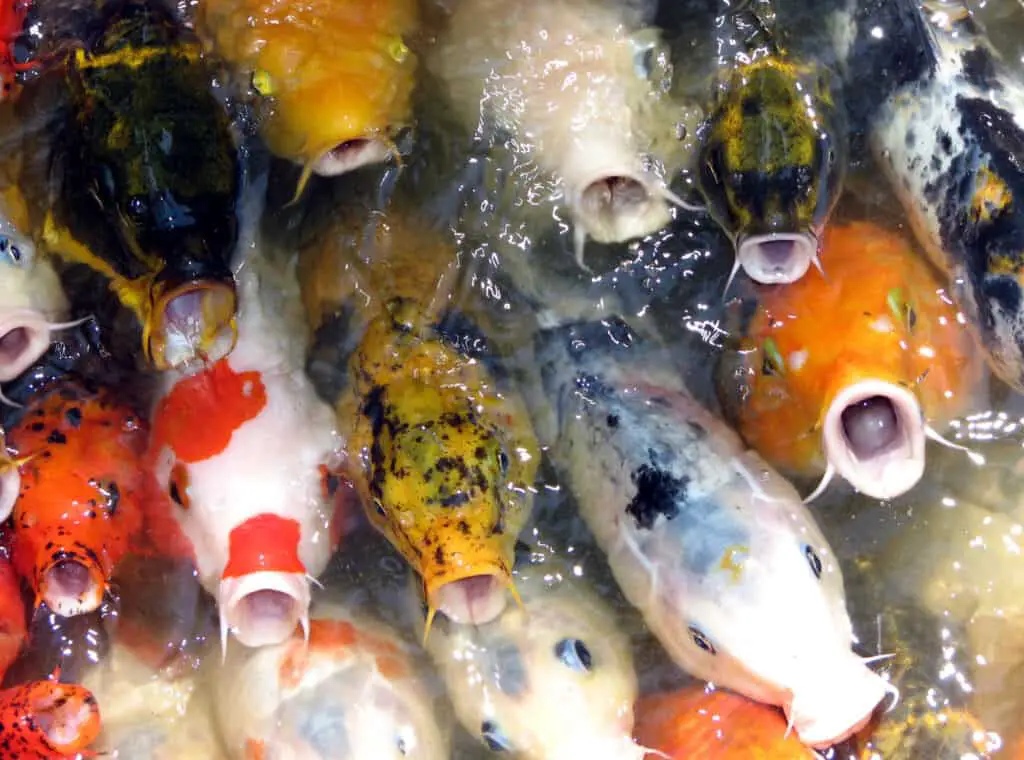
One of the biggest joys for a koi pond owner is to see the beautiful, flashy fish gliding to the surface as they approach. These fish can be absolute characters and bob their heads out of the water in anticipation. Some even like to be petted. Like some spoiled housepets, koi are sometimes overfed, leading to health issues or affecting the condition of the water.
If koi live in a large ecosystem type of pond, there is very little need to feed them too often as they should be able to forage naturally. A handful of pellets a few times a week is usually sufficient to ensure that the fish get the minerals and vitamins needed for healthy growth.
However, koi need to be fed regularly to thrive in smaller backyard pond setups. They look forward to the arrival of their person to shower the surface with food. When feeding, ensure the food is of the appropriate size for all sizes of fish in the pond. Bigger fish will quickly snap up the lion’s share of the available food if only large pellets are provided.
Koi hibernate during the cold winter months, so they should not be fed at all at that time. Shortly before the cold winter, increase the amount of carbohydrates in their diet so the fish store enough energy to get through winter.
If you want to know more about how to feed your koi fish in the winter, you can read my blog posts here: at what temperature do I stop feeding my koi fish? And how long can koi fish go without food?
There is a 5-minute rule that should apply when feeding koi. Slowly add food to the water and let them eat as much as they can within 5 minutes. That is enough time for them to feed. Do not feed if the water temperature drops below 50F as they digest less efficiently when it is cold.
To learn more about how to feed koi fish, you can read my blog posts here: How many times a day should I feed my koi fish? And How many pellets to feed koi fish?
Flakes are usually preferable for smaller fish, and if there are a few bold feeders in the group, mix floating and sinking koi pellets, so the food spreads out.
Can A Koi Bite You?
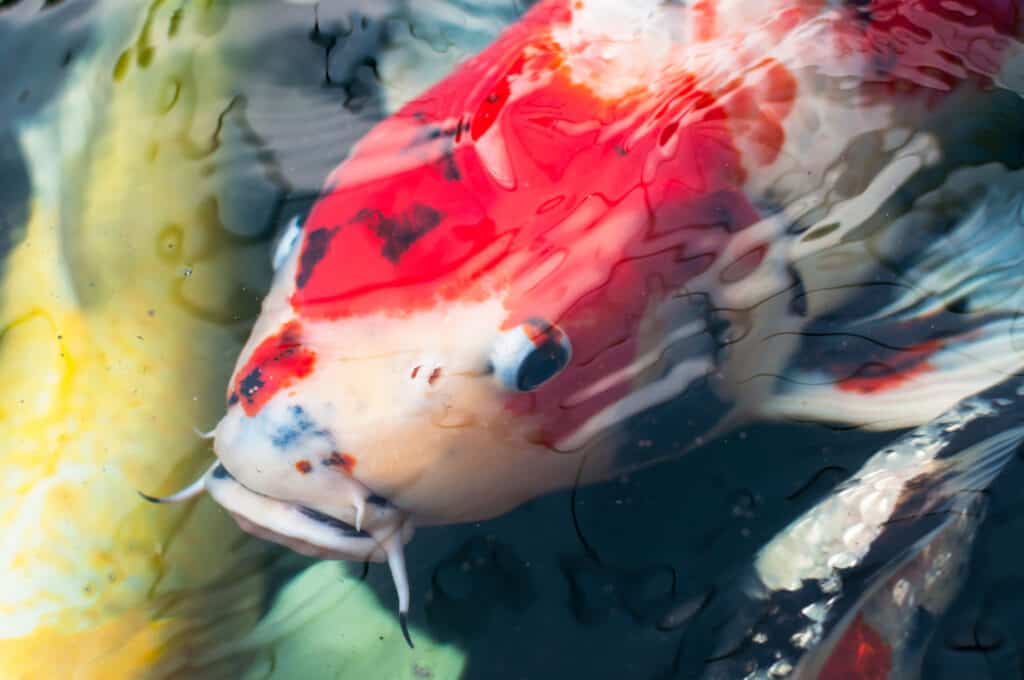
Part of the fun of keeping a pond of koi is interacting with them, especially at feeding times. They
Swim enthusiastically to the surface, and many koi owners are able to hand-feed treats to their pampered pets.
Consistency is essential if you want to train your koi to take food from your hand. These intelligent fish quickly learn the routine, recognize individuals, and will get excited in anticipation long before you actually feed them.
You may be worried that they will bite your fingers instead of the food being offered if they get too enthusiastic. Fortunately, even if they do grab a bit of your finger with the food, it won’t be painful, and their mouth cant rupture your skin.
Koi do have teeth, but luckily they are far back in their mouths, so the worst that may happen is that your pet koi’s gummy mouth could close on your finger. This can give you a small fright the first time it happens, but it isn’t any need for concern. You can confidently enjoy spending time with your koi without any risk of injury from bites.
To learn more about koi fish behavior, you can read my blog post here: Koi fish: Are they aggressive?
Can I Touch My Koi fish?
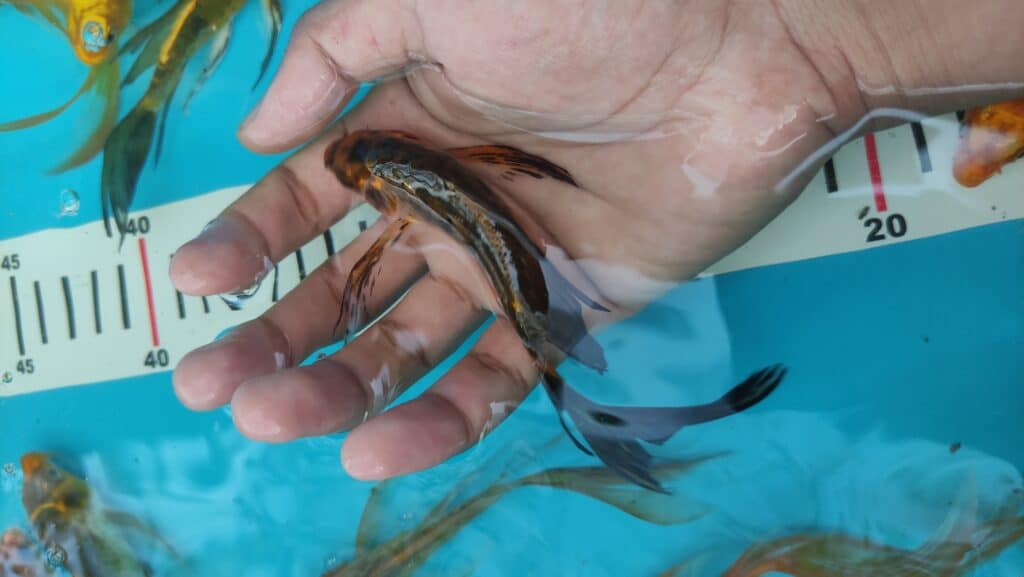
Once your koi are established in a pond and have a routine, you may find that they start coming closer. You will begin to identify individuals with different personalities. Some koi are bolder, while others prefer to stay among the cover of plants.
Once a koi has learned to eat from its owner’s hands, it may also tolerate, or even enjoy, being gently stroked or having its head tickled. This is not a process that can be rushed as the fish needs first to develop complete trust and see the owner as a provider, not a predator.
Never lift a koi out of the water to pet it. Once it starts coming closer, gently let your fingers brush against it as it swims past. Over time, the fish will become bolder and will enjoy the interactions. It is essential that before you stick your hands in the koi pond, you wash off any hand lotions, sun protection creams, or other residues that may be on them.
Conclusion
Koi will readily consume a varied diet, but they are not dogs, so dog food is not a healthy staple food for them. Feeding them dog food occasionally as a treat won’t do any harm, but it is not a good long-term feeding option to use a staple diet. Feeding koi dog food for too long can result in a chronic condition known as fatty liver disease.
References:
https://www.animalpicturesarchive.com/can-you-feed-koi-dog-food/
https://thefishsite.com/articles/managing-ammonia-in-fish-ponds#
https://www.petmd.com/dog/nutrition/What-Is-AAFCO-and-What-Does-It-Do
https://dogcare.dailypuppy.com/dog-food-brands-include-omega6-fatty-acids-6271.html
https://en.wikipedia.org/wiki/Koi
https://www.petmd.com/fish/care/evr_fi_facts-about-koi-fish
